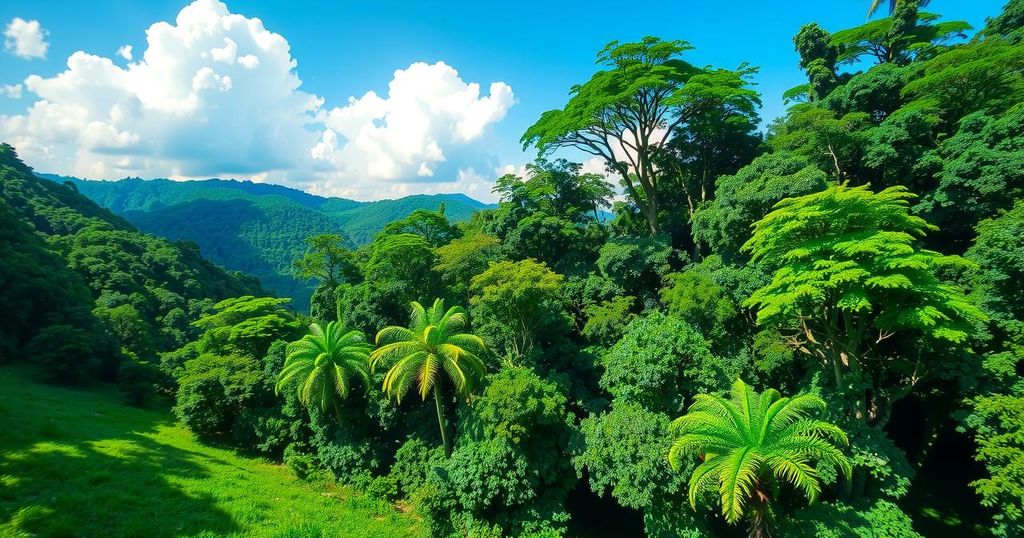Suriname Elects New Government Amid Promising Oil Wealth

Suriname held parliamentary elections on Sunday to elect a new government that will manage the country’s oil wealth in light of recent offshore discoveries. High unemployment, inflation, and poverty present challenges, yet there is optimism with the potential economic benefits. Key contenders include incumbent President Chan Santokhi’s Progressive Reform Party and other notable opposition parties. Provisional election results are anticipated soon, with significant implications for the nation’s future economy and energy policies.
Voting commenced on Sunday in Suriname’s parliamentary elections, a pivotal moment that will decide which party can best manage the country’s newfound oil wealth, potentially transforming its economic landscape. Suriname is the smallest country in South America and, alongside facing high debt and rampant inflation, almost 20% of its 600,000 citizens live in poverty. However, recent discoveries of offshore oil reserves promise to turn the tide for this tiny nation.
Incumbent President Chan Santokhi noted the significance of this economic opportunity, stating, “It will be a huge amount of income for the country. We are now able… to do more for our people so that everyone can be part of the growth of the nation.” Sunday’s polls allowed voters to elect a new 51-member parliament, which will soon select a new president and vice-president for a five-year term. While Santokhi is eligible for re-election, the political landscape appears quite competitive with no clear frontrunner.
Defence Minister Krishna Matheora emphasized the importance of continuity, stating, “We have laid the foundations for economic stability and we need to build on that.” He believes it is crucial for Santokhi’s Progressive Reform Party (VHP) to secure victory amidst the uncertain polling data. The incoming leadership will have the potential to dramatically shift the nation’s economic trajectory, thanks to billions expected from new oil projects.
TotalEnergies, a French group, announced a project that will likely yield $10.5 billion from an oil field off the coast, producing an anticipated 220,000 barrels daily starting in 2028. Suriname has initiated a “Royalties for Everyone” fund, aiming to distribute portions of this anticipated wealth directly to its residents.
In the election, fourteen parties are vying for positions, including Santokhi’s VHP and the left-leaning National Democratic Party (NDP) led by the late former President Desi Bouterse. Also noteworthy is the General Liberation and Development Party (ABOP), which is under Vice President Ronnie Brunswijk, a former guerrilla fighter. Provisional results are expected by late Sunday evening.
Suriname, known for its rich cultural tapestry comprised of descendants from diverse ethnic groups, is approaching its 50th anniversary of independence from the Netherlands this November. Since achieving independence, the nation has increasingly allied with China, becoming one of the earliest Latin American countries to join its Belt and Road Initiative in 2019.
The U.S. has taken notice of this shifting alliance. In March, Secretary of State Marco Rubio visited Suriname on a Latin American tour aimed at countering China’s regional influence. With over 90% of its land covered in forests, Suriname notably maintains a negative carbon footprint, a distinction it hopes to protect as it navigates the development of its oil resources. Santokhi reassured citizens that the oil wealth could facilitate a transition to greener energy, stating, “It will be gone after 40 years.”
Suriname’s parliamentary elections on Sunday are a crucial moment for the nation as it seeks to harness its newfound oil wealth amid existing economic struggles. With various parties participating, the election holds not just implications for immediate leadership but for long-term economic stability and environmental preservation. The results could set the course for Suriname’s future in utilizing its resources for broader national development and advancements in green energy solutions.
Original Source: www.rfi.fr







